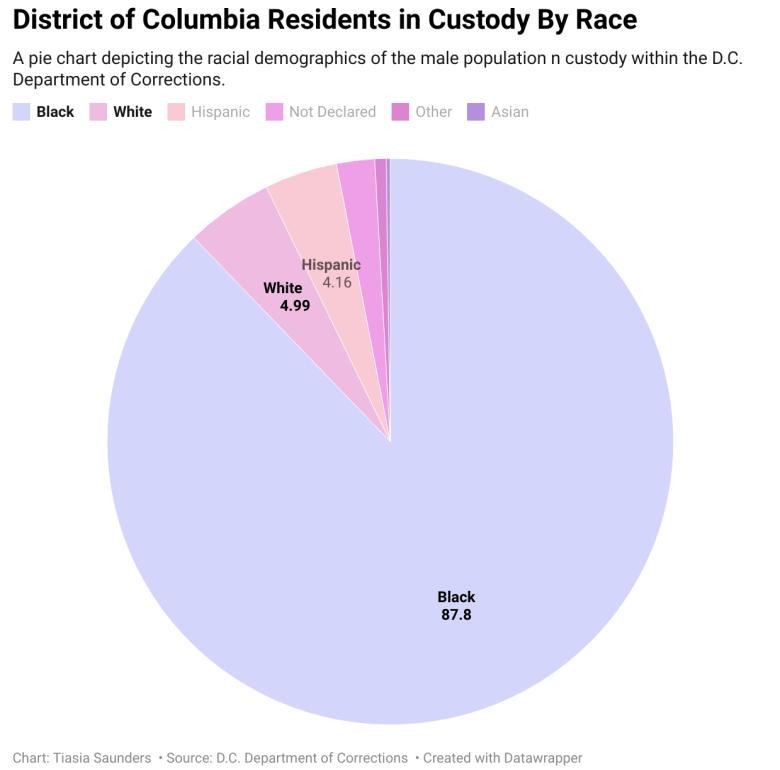While advocates nationwide have long called out racial disparities in the criminal justice system, research reveals that Black residents in the District face disproportionately high pretrial detention rates, and under-resourced areas, such as Wards 7 and 8, experience the brunt of the injustice.
“D.C. is not immune to the racial disparities that plague the justice system nationally,” said Kevin Beckford, a senior associate of partnership and engagement at the Pretrial Justice Institute. “Black residents make up nearly half of D.C.’s population, but are disproportionately represented in pretrial detention, reflection patterns seen in other major cities.”
According to a 2018 Institute of Justice Brief, income inequality, systemic biases, and a lack of bail reform continue to drive racial disparities, severely affecting Black Americans and their communities nationwide.
According to Pew Charitable Trusts, as of 2022, Black Americans were admitted to jail more than four times the rate of white Americans. In addition, 2022 data revealed Black Americans are the most probable population to be held in jail before trial, receive lengthier sanctions, and have a higher bail set.
“Research has shown that pretrial detention for as little as 24 hours can have case-altering and life-altering effects. Those remaining in pretrial detention more than one day are more likely to be convicted, to be sentenced to jail or prison, and to receive longer sentences,” said Bonnie Hoffman, director of public defense at the National Association of Criminal Defense Lawyers.
In an effort to avoid subjective biases that could disproportionately target vulnerable groups, some areas — including Washington, D.C. — opted to end cash bail systems and implement a scientific risk assessment tool instead.
Since the 1990s, the District has utilized data to gauge whether individuals can be trusted to come back to court and abide by the law in the meantime, an approach Beckford said reinforces systemic inequalities.
“Risk assessment tools, which are intended to be objective, often incorporate data points tied to systemic inequalities — like prior arrests, employment stability or housing status, making it more likely for Black individuals to be flagged as high-risk,” he told The Informer. “Replacing them with community-led, holistic approaches to pretrial decision-making could improve outcomes.”
Historic Oppression, Preventing Involvement in the Justice System
Historically, Black Americans’ incarceration stems from slavery and the post-Civil War era. Laws such as Black Codes, vagrancy statutes and convict leasing systems were designed to control and exploit newly freed Black people.
Qiana Johnson, co-founder of Harriet Wildest Dream, an organization dedicated to protecting and helping Black Americans in the justice system, explained the origin of Black incarceration.
“The system originally designed to capture and oppress Black people started as slave patrolling,” Johnson said. “It reformed itself from slave patrolling to what we see today. The entire system was designed as a way to protect the property of white people.”
According to a January 2024 report from the D.C. Department of Corrections, Black Americans make up 87.8% of the incarcerated population. Additionally, 35.8% of men admitted into the intake process were placed in pretrial detention.
Several organizations, including The Bail Project, a national nonprofit committed to ending wealth-based detention, are focused on eliminating disparities within the pretrial detention system.
Jeremy Cherson, director of communications at the Bail Project, said that there should be certain circumstances when considering the detention of an individual.
“Most Americans agree that people charged with minor offenses and nonviolent crimes should not be incarcerated pretrial. They believe that people who are struggling with addiction, mental illness, homelessness, or extreme poverty need help, not incarceration,” Cherson told The Informer. “We need to invest more in the types of services that prevent justice system involvement in the first place.”


